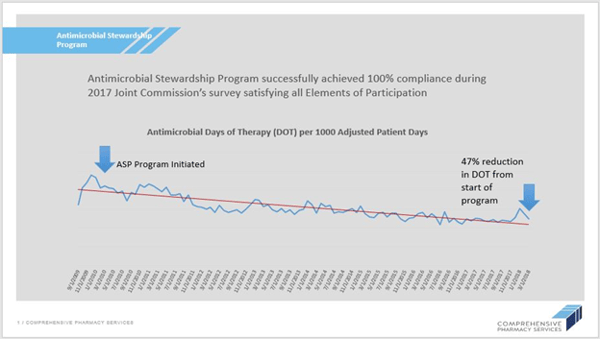Your Hospital May Be At Risk for Dangerous Drug-Resistant Superinfections
Though antibiotics have transformed medicine, the Centers for Disease Control (CDC) warns that the misuse of antibiotics have contributed to antibiotic resistance and the rise of deadly “superbugs”. The CDC estimates that more than two million people are infected with antibiotic-resistant organisms, resulting in approximately 23,000 deaths annually.[1] Patients unnecessarily exposed to antibiotics may be at risk for serious adverse events with no clinical benefit.
Studies indicate that 20 to 50 percent of antibiotics prescribed in hospitals are unnecessary or inappropriate.[2] The CDC identifies infection from Clostridium difficile (C.diff) as a major health threat and an unwanted effect of antibiotics. C. diff can easily spread from person to person, causing life-threatening diarrhea. A CDC study found that C.diff caused nearly a half million infections in patients in the United States in a single year, and an estimated 15,000 deaths each year are directly attributable to C.diff infections.[3]
Reducing Antibiotic Consumption
By using fewer antibiotics and using them responsibly, hospitals can reduce the likelihood of C.diff infection and antibiotic resistance while bringing down their facility’s antibiotic spend and improving patient outcomes.
On January 1, 2017, The Joint Commission’s Medication Management standard for hospitals, critical access hospitals and nursing care centers went into effect which requires hospitals to have an antimicrobial stewardship program in place.[4] The Joint Commission requires eight elements of performance for stewardship. The Centers for Medicare and Medicaid Services (CMS) and the CDC also have published requirements and regulations that hospitals must meet regarding antibiotic stewardship.
Recommendations for an Antimicrobial Stewardship Program
A robust Antibiotic Stewardship Program can reduce the risk of dangerous superinfections. A CPS year-long pilot study of 180 hospital followed the Joint Commission standards and CMS and CDC requirements and regulations. Participating facilities in the CPS study achieved significant reductions in antibiotic consumption over a one-year period. Even with 3 to 4 percent drug inflation, all facilities combined saved $3,386,111 from the baseline period.
Over a multi-year period, CPS’ Antimicrobial Stewardship Program achieved 100 percent compliance with The Joint Commission and resulted in a 47 percent reduction in antimicrobial days of therapy since the program’s start.

CPS can help your hospital or health system with an effective antimicrobial stewardship program that reduces antibiotic use and cost, improves patient outcomes and meets requirements from The Joint Commission, CMS and CDC. Contact us to learn more: contactus@cpspharm.com.
[1] https://www.cdc.gov/antibiotic-use/healthcare/implementation/core-elements.html
[2] https://www.cdc.gov/antibiotic-use/healthcare/implementation/core-elements.html
[3] https://www.cdc.gov/hai/organisms/cdiff/cdiff_infect.html
[4] https://www.jointcommission.org/assets/1/6/New_Antimicrobial_Stewardship_Standard.pdf